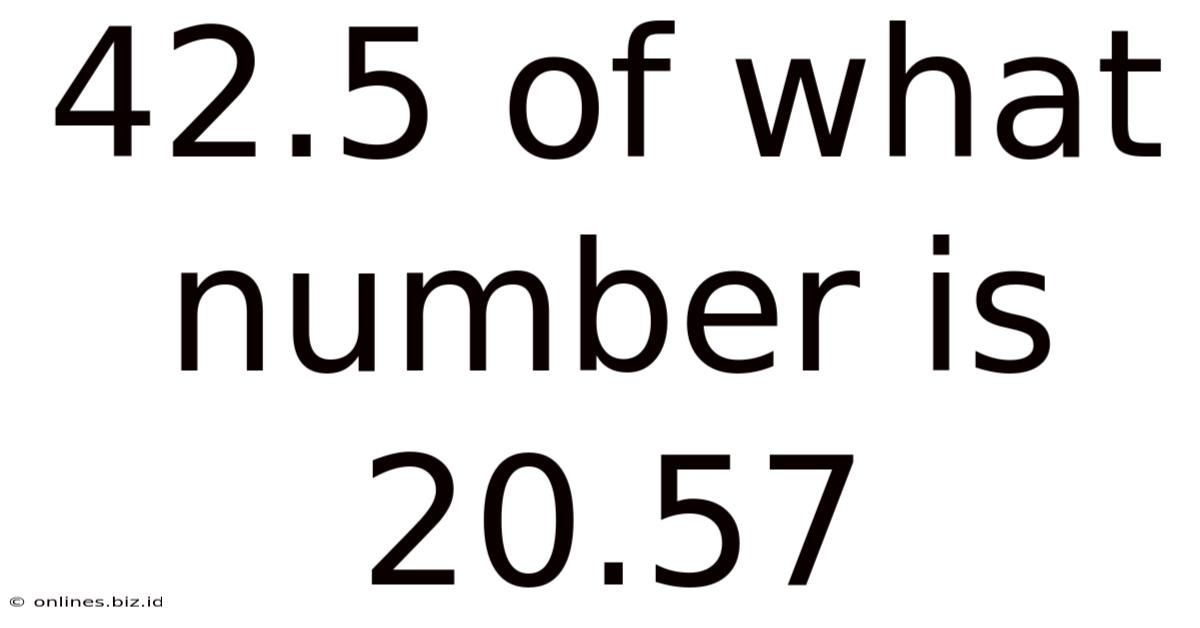42.5 Of What Number Is 20.57
Onlines
May 11, 2025 · 4 min read

Table of Contents
42.5% of What Number is 20.57? A Deep Dive into Percentage Calculations
This seemingly simple question, "42.5% of what number is 20.57?", opens the door to a fascinating exploration of percentage calculations, their applications in various fields, and the underlying mathematical principles. We'll not only solve this specific problem but also delve into the broader context of percentage problems, equipping you with the skills to tackle similar challenges with confidence.
Understanding Percentages: The Foundation
Before tackling the problem directly, let's solidify our understanding of percentages. A percentage is simply a fraction expressed as a part of 100. For example, 42.5% can be written as 42.5/100 or 0.425 as a decimal. This decimal representation is crucial for performing calculations efficiently. The phrase "x% of y" translates mathematically to (x/100) * y.
Breaking Down the Problem: 42.5% of x = 20.57
Our problem states: 42.5% of what number is 20.57? Let's represent the unknown number with the variable 'x'. We can translate the problem into a mathematical equation:
(42.5/100) * x = 20.57
This equation forms the basis of our solution.
Solving the Equation: Step-by-Step Approach
To solve for 'x', we'll employ a series of algebraic manipulations. The goal is to isolate 'x' on one side of the equation.
Step 1: Simplify the Percentage
First, we simplify the percentage fraction: 42.5/100 = 0.425. Our equation now becomes:
0.425 * x = 20.57
Step 2: Isolate x
To isolate 'x', we divide both sides of the equation by 0.425:
x = 20.57 / 0.425
Step 3: Calculate the Result
Performing the division, we get:
x ≈ 48.5
Therefore, 42.5% of approximately 48.5 is 20.57.
Verifying the Solution
It's always a good practice to verify our solution. We can do this by substituting the calculated value of 'x' back into the original equation:
(42.5/100) * 48.5 = 20.57
0.425 * 48.5 ≈ 20.57
The slight discrepancy is due to rounding during the calculation. The result is accurate enough for most practical purposes.
Alternative Approach: Using Proportions
Percentage problems can also be solved using proportions. This method is particularly useful for visualizing the relationship between the parts and the whole. We can set up a proportion as follows:
42.5/100 = 20.57/x
This states that the ratio of 42.5 to 100 is equal to the ratio of 20.57 to the unknown number 'x'. We can cross-multiply to solve for 'x':
42.5x = 20.57 * 100
42.5x = 2057
x = 2057 / 42.5
x ≈ 48.5
This method yields the same result as the previous approach, confirming our solution.
Real-World Applications of Percentage Calculations
Percentage calculations are ubiquitous in various aspects of life, from finance to science, and from everyday shopping to complex statistical analyses. Here are some examples:
Finance:
- Interest Calculations: Banks and financial institutions use percentages extensively to calculate interest on loans, savings accounts, and investments.
- Tax Calculations: Taxes, both income tax and sales tax, are expressed as percentages of income or purchase price.
- Profit and Loss: Businesses use percentages to track their profit margins and calculate losses.
- Discounts and Sales: Retail stores frequently offer discounts expressed as percentages.
Science:
- Concentration of Solutions: In chemistry, percentages are used to represent the concentration of solutions, such as percentage by weight or percentage by volume.
- Statistical Analysis: Percentages are frequently used to present statistical data and interpret trends.
Everyday Life:
- Tip Calculations: Restaurants often suggest a percentage tip.
- Sales Tax Calculations: Customers calculate sales tax, which is a percentage of the purchase price.
- Grading and Assessment: Educational institutions use percentages to express grades and scores.
Advanced Percentage Problems and Techniques
While the problem we initially addressed was relatively straightforward, many percentage problems are more complex. These often involve multiple percentages, sequential changes, or the need to work backward from a final result.
Compound Percentages:
Compound percentages involve applying a percentage change repeatedly. This is often seen in compound interest calculations, where the interest earned is added to the principal, and subsequent interest is calculated on the larger amount.
Percentage Increase and Decrease:
These calculations involve determining the percentage change between two values. The formula for percentage increase is: [(New Value - Old Value) / Old Value] * 100. Similarly, the formula for percentage decrease is: [(Old Value - New Value) / Old Value] * 100.
Working Backwards:
Some percentage problems require working backward to find an initial value, given a final value and a percentage change. This involves using algebraic manipulation to solve for the unknown starting value.
Conclusion: Mastering Percentage Calculations
Mastering percentage calculations is a valuable skill applicable across numerous disciplines. By understanding the underlying mathematical principles, employing different solution techniques (such as the algebraic method and the proportion method), and practicing with a range of problem types, you can build your confidence and competence in handling percentage-related challenges efficiently and accurately. The simple question, "42.5% of what number is 20.57?", thus serves as a springboard to a much deeper understanding of a fundamental mathematical concept and its far-reaching applications. Remember to always check your work and consider using different methods to verify your solution, ensuring accuracy and confidence in your results.
Latest Posts
Latest Posts
-
Based On The Model What Will Be The Mean Diameter
May 12, 2025
-
Ekg Strip Counting Practice Sheet Answers
May 12, 2025
-
Summary Of My Introduction To Gothic Literature
May 12, 2025
-
Which Of The Following Statements Is True About Anxiety
May 12, 2025
-
A 45 Year Old Male Was Working On His Roof
May 12, 2025
Related Post
Thank you for visiting our website which covers about 42.5 Of What Number Is 20.57 . We hope the information provided has been useful to you. Feel free to contact us if you have any questions or need further assistance. See you next time and don't miss to bookmark.